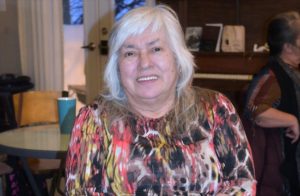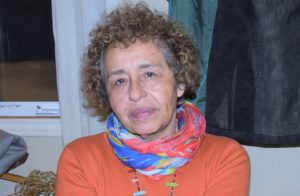Words dance in Lee Maracle’s writing workshop

By Kelly Anne Smith
NIPISSING FIRST NATION— Lee Maracle led the Aanmitaagzi workshop titled Wording Transformation at Big Medicine Studio February 19-21.
“If people can express themselves, then they can get past whatever happens in life,” stated Lee Maracle.
A prolific author, Maracle of Stó:lō Nation forced the female Indigenous voice onto both Indigenous and mainstream literature. Maracle pounded the pavement to have her first book, Bobbi Lee: Indian Rebel, published in 1975. Her latest book, Hope Matters, is a collaboration with daughters Columpa Bobb and Tania Carter.
Lee Maracle is also the mother of Sid Bobb, Aanmitaagz co-director with Nipissing First Nation’s Penny Couchie at Big Medicine Studio.
The famed author explored sound, language and story during the writing workshop. The finale was an open mic reading showcasing budding poets.
Maracle is concerned about expression and called the three-days very intense.
“Lot’s of mountains got moved and things got shifted. Some terrific writing came out of it.”

Participant Mary Laronde was inspired, calling Maracle’s workshop creative.
“Poetry is a different way to get at what you are trying to say.”
Laronde called Lee a wonderful teacher.
“There were a lot of anecdotal stories that brought a lot of points to life.”
Laronde said there was a lot of laughter and some tears over the three days.
“She was able to pull some truth out of you by giving exercises. There is the idea of where you dig in and visualize what it is you are trying to say so it is not abstract. It has to mean something to you and it has to be real to mean something to somebody else. It was a process of really dig inside of yourself to expose what you are really talking about. What are you really trying to say. Lee would proud for the authentic part of it.”
At the mic, Laronde first spoke towards Lee.
“It was an honour to be here with you Lee because I learned so much. Miigwech.”
Laronde is from Temagami First Nation. Her father is from Nipissing First Nation. She describes her usual writing style as journalistic, having engaged in community development for Anishinabek Nation. Maracle’s poetic direction had Laronde thinking about her place in the world.
“It’s about transformation,” announced Laronde as she introduced her poems.
Shape shifting clouds break open
Sun on my face
and there comes your face again
smiling
loving me back to me
the poplar trees make music
yellow paper shakers
my grandma
my aunts
my mom and me
under the quivering golden tree
I do not know yet
how hard this light and dark with be
I am only three
-By Mary Laronde
Three Generations
Three generations of ringlets of girls
red wool jackets
moosehide cuffs and collars
bone buttons, beaver and beans
strawberries on bannock
eyes glistening black
dark beauty like stars shining on water
stars shining in water
glistening black
defying depth
daring light
night wonder
day on horizon
beyond hope beckons
with promises to be kept
or broken
Grandmother guides,
dances, sings, hopes
I am the one
Grandmother, dance with me now
I saw you shine at me once
a long time ago
faceless light
in a blue gingham dress
bringing me cookies
to sweeten your message
you feel this because you are more
I did not forget
Grandmother, dance with me now
-By Mary Laronde
Lee Maracle has helped people for close to three decades through writing to find their inner voice again.
“The reason I do this is because when I first started writing, I was so lonesome for another Indigenous writer. The only other one I knew was Maria Campbell. She lived almost a thousand miles away,” explained Maracle. “What I say is no one has the right to stop you from speaking. My bold voice comes from people unsuccessfully trying to stop me.”
Maracle laughs her endearing chuckle.
“You don’t have to have a bold voice to be listened to. My grandfather (Chief Dan George) had a soft voice. But everybody listened to him. He was told he couldn’t speak at Canada’s 167th celebration,” recalled Maracle. “He wrote a poem called Lament for Confederation. And he spoke that while his sons and his daughters sang in the background. And people were shocked. I remember there was 37, 000 people at that stadium and the MC was saying ‘I thought he wasn’t supposed to speak. Is he speaking? Is that poetry? Is that a song? What is this?’”
“It was the first spoken word in music piece in the world,” stated Maracle. “A whole lot of other people followed suit. It became a voice of resistance all across North America. And now, the world. I was 17 and remember thinking my grandpa’s a radical. Woo-hoo, red power!”
“I think that women need a bold voice if they are going to get things changed. That’s why my voice is very direct, very bold, very assertive.”
Maracle talked of being shut out of a literature festival in Vancouver.
“I asked them to invite me and they said no. I said okay and went to the festival and crashed the party,” recalled Maracle. “I thought if my grandfather could recite The Lament for Confederation – one of the most famous Indigenous poems – after being told not to talk, then I could get up and read from Bobbi Lee.”
The festival was in Maracle’s ancestral village in Snauq/False Creek.
“They are standing on my home land and they won’t let us speak. They didn’t invite any Indigenous writers to that festival,” recollected Maracle. “They reminded me of this not too long ago. I’ve been invited back many times as have dozens of other Indigenous writers. We pick up on it and excel.”
Lee read her poem Shape Shifting Clouds created during the workshop.
Shape shifting clouds
pine needles
patterned and wild
geometrics of earthen greens
chlorophyll and earth
muddied brown
I smear my skin
I feel this dirt
I smell it
knead it
I put it
and plant it
it waits
hopes for the opportunity
shoot
shoot, squirm, rage
muscle up
-By Lee Maracle
“I think at one time Indigenous people were heroic. They were wonderful people and then they lost faith in themselves. Writing and expressing yourself helps to restore faith. I think what is inspiring is the restoration of the belief in themselves,” noted Maracle. “We are about art. Art is our way of life. The words dance inside.”

